 April 15, 2021 John E. Ross, KD8IDJ, Editor
| ||||||
World Amateur Radio Day is April 18 ARRL wishes all of our members and friends a very happy World Amateur Radio Day, Sunday, April 18! Join us in celebrating the global community of radio amateurs who explore, develop, and enjoy radio communication. Hiram Percy Maxim Memorial Station W1AW will be on the air on April 18 from ARRL Headquarters in Connecticut. World Amateur Radio Day celebrates the 1925 founding of the International Amateur Radio Union (IARU), which has chosen "Amateur Radio: Home but Never Alone" as its theme for this year's anniversary. Updated Radio Frequency Exposure Rules Become Effective on May 3 The FCC has announced that rule changes detailed in a lengthy 2019 Report and Order (R&O) governing RF exposure standards go into effect on May 3, 2021. The new rules do not change existing RF exposure (RFE) limits but do require that stations in all services, including amateur radio, be evaluated against existing limits, unless they are exempted. For stations already in place, that evaluation must be completed by May 3, 2023. After May 3 of this year, any new station, or any existing station modified in a way that's likely to change its RFE profile -- such as different antennas or placement, or greater power -- will need to conduct an evaluation by the date of activation or change. "In the RF Report and Order, the Commission anticipated that few parties would have to conduct reevaluations under the new rules and The Amateur Service is no longer categorically excluded from certain aspects of the rules, as amended, and licensees can no longer avoid performing an exposure assessment simply because they are transmitting below a given power level. "For most amateurs, the major difference is the removal of the categorical exclusion for amateur radio, which means that ham station owners must determine if they either qualify for an exemption or must perform a routine environmental evaluation," said Greg Lapin, N9GL, Chair of the ARRL RF Safety Committee and a member of the FCC Technological Advisory Council (TAC). "Ham stations previously excluded from performing environmental evaluations will have until May 3, 2023, to perform these. After May 3, 2021, any new stations or those modified in a way that affects RF exposure must comply before being put into service," Lapin said. The December 2019 RF R&O changes the methods that many radio services use to determine and achieve compliance with FCC limits on human exposure to RF electromagnetic fields. The FCC also modified the process for determining whether a particular device or deployment is exempt from a more thorough analysis by replacing a service-specific list of transmitters, facilities, and operations for which evaluation is required with new streamlined formula-based criteria. The R&O also addressed how to perform evaluations where the exemption does not apply, and how to mitigate exposure. Amateur radio licensees will have to determine whether any existing facilities previously excluded under the old rules now qualify for an exemption under the new rules. Most will, but some may not. "For amateurs, the major difference is the removal of the categorical exclusion," Lapin said, "which means that every ham will be required to perform some sort of calculation, either to determine if they qualify for The ARRL Lab staff is available to help amateurs to make these determinations and, if needed, perform the necessary calculations to ensure their stations comply. ARRL Laboratory Manager Ed Hare, W1RFI, who helped prepare ARRL's RF Exposure and You book, explained it this way. "The FCC did not change any of the underlying rules applicable to amateur station evaluations," he said. "The sections of the book on how to perform routine station evaluations are still valid and usable, especially the many charts of common antennas at different heights." Hare said ARRL Lab staff also would be available to help amateurs understand the rules and evaluate their stations. RF Exposure and You is available for free download from ARRL. ARRL also has an RF Safety page on its website. The ARRL RF Safety Committee is working with the FCC to update the FCC's aids for following human exposure rules -- OET Bulletin 65 and OET Bulletin 65 Supplement B for Radio Amateurs. In addition, ARRL is developing tools that all hams can use to perform exposure assessments. St. Vincent Radio Amateurs on Alert During Volcano Emergency Donald de Riggs, J88CD, on the Caribbean island of St. Vincent, says that on April 13, the 42nd anniversary of the 1979 eruption of the La Soufrière volcano, island residents were awakened to another column of volcanic ash creating a thick blanket obscuring part of the eastern sky as the volcano continues to erupt violently.
"Almost all residents in the Red Zone have been evacuated, save for a few diehards who will not move, for reasons unknown," he said. Since the effusive eruption began last December, local hams have been in a state of readiness via 2-meter networks and regional networks via HF. A 24-hour regional HF network and vigil has been active since violent eruptions resumed earlier this month to provide communication support should telephone service be disrupted by the volcanic hazard. This includes a twice-daily link-up on HF with the Caribbean Disaster Emergency Management Agency (CDEMA). There is also a 2-meter gateway via EchoLink on the J88AZ node. The other active VHF repeater is the main resource for domestic communications. The Grenada repeater, which is linked to St. Lucia and Barbados, is also accessible by hams in Tobago, Trinidad, and St. Vincent and the Grenadines. Frequencies being used for disaster-related communications may include 3.815, 7.188, or 7.162 MHz. Volcanic ash is also falling in Barbados, Dominica, St. Lucia, and Grenada. The La Soufrière volcano on St. Vincent began its most recent series of explosive eruptions on April 9, sending clouds of hot ash some 20,000 feet into the air, blanketing much of the island in ash and causing water and power outages. The volcano is "a constant threat," according to CDEMA. -- Thanks to The Daily DX ARRL Podcasts Schedule
The On the Air and Eclectic Tech podcasts are sponsored by Icom. Both podcasts are available on iTunes (iOS) and Stitcher (Android), as well as on Blubrry -- On the Air | Eclectic Tech. National Science Foundation Funds Creation of Research Lab at Alaska's HAARP A 5-year, $9.3 million National Science Foundation (NSF) grant will allow the University of Alaska Fairbanks (UAF) Geophysical Institute to establish a new research observatory at the High-frequency Active Auroral Research Program (HAARP). A former military facility, HAARP is now operated by UAF and is home to HAARP Amateur Radio Club's KL7ERP. The new Subauroral Geophysical Observatory for Space Physics and Radio Science will be dedicated to exploring Earth's
upper atmosphere and geospace environment. The facility's 33-acre Ionospheric Research Instrument will be the centerpiece of the observatory. "This NSF support will provide the scientific community increased access to the instruments at the observatory and, hopefully, grow the scientific community," said Geophysical Institute Director Robert McCoy, the project's principal investigator. A second NSF-funded project will add a Light Detection and Ranging (LiDAR) instrument at the site, which will allow the study of other regions of the upper atmosphere. UAF hopes to add additional instruments over time at the Gakona, Alaska, research site. The research grant will allow scientists to investigate how the sun affects Earth's ionosphere and magnetosphere to produce changes in space weather. Their work will help fill gaps in knowledge about the region, which is important because ionospheric disturbances, if severe enough, can disrupt communication systems and damage the power grid. Research at the observatory is initially expected to include the study of various types of aurora and other occurrences in the ionosphere. The Gakona facility is a prime location for the study of the ionosphere and magnetosphere because of its location in relation to one of Earth's magnetic field lines that reaches deep into the magnetosphere. "Amateur radio will clearly benefit with an improved understanding of ionospheric propagation and space weather physics, and providing improved HF propagation prediction modeling data," HAARP Research Station Chief Engineer and ARRL Life Member Steve Floyd, W4YHD, told ARRL. He said, "Radio science experiments will also provide a valuable data set to encourage development of new radio technologies and modulation methods." Floyd is the trustee for KL7ERP, which, he says, is available "to demonstrate amateur radio to visiting scientists and students, to maintain contact with Alaska hams, and to provide visiting hams with an opportunity to operate from this unique Alaska location." Read an expanded version. ARRL Learning Network Webinars Visit the ARRL Learning Network (a members-only benefit) to register, check on upcoming webinars, and to view previously recorded sessions. Finding and Fixing RFI -- Paul Cianciolo, W1VLF, on Tuesday, April 20, 2021 at 1 PM EDT (1700 UTC) Radio frequency interference (RFI) has been a problem for ham radio HF Noise Mitigation -- ARRL Northwestern Division Director Mike Ritz, W7VO, on Thursday, May 6 at 3:30 PM EDT (1930 UTC) An educational seminar to help both new and experienced HF operators who find themselves plagued with noise. We'll learn what "noise" is, discuss the various noise sources, and talk about how to mitigate those noises using a variety of techniques. W1AW Antenna Farm -- W1AW Station Manager Joe Carcia, NJ1Q, on Tuesday, May 18, at 1 PM EDT (1700 UTC) Experience a bird's-eye view and description of the antennas used by W1AW for the station's scheduled transmissions and visiting operator activity. All the antennas used at W1AW are single-band Yagis. Viewers will also see the 5 GHz sector antennas that are part of W1AW's AREDN system. These Learning Network presentations are sponsored by Icom. ARRL members may register for upcoming presentations and view previously recorded Learning Network webinars. ARRL-affiliated radio clubs may also use the recordings as presentations for club meetings, mentoring new and current hams, and discussing amateur radio topics. The ARRL Learning Network schedule is subject to change. Archive of Marconi Papers and Correspondence Acquired by California Museum The Huntington Library, Art Museum, and Botanical Gardens in San Marino, California, has acquired an archive of papers and correspondence to, from, and about wireless pioneer and Nobel Laureate Guglielmo Marconi. Among the more than 200 pages of "Marconi transformed the speed and effectiveness of telecommunication through wireless telegraphy," said Daniel Lewis, who is responsible for the Huntington Library's history of science and technology holdings from 1800 to the present. Marconi was relentless in his attempts to improve on his radio work, as reflected in this archive. "Working very hard to try and find out what are the somewhat occult causes which make signals good one night and unobtainable the next," he wrote to Vyvyan in 1907. "I believe I have found, if not very clearly, the cause of the effects noticed." Vyvyan was largely responsible for the construction and operation of the transmitting station at Poldhu in Cornwall, from where the first-ever transatlantic signal was sent to Newfoundland on December 12, 1901. He was also in charge of the Cape Breton Island station the following year, when the first signal was sent in the opposite direction. Read an expanded version. Amateur Radio in the News ARRL Public Information Officers, Coordinators, and many other member-volunteers help keep amateur radio and ARRL in the news. Share any amateur radio media hits you spot with us.
Share any amateur radio media hits you spot with us. Intrepid-DX Group Joins Forces with LA7GIA in Bouvet Island Attempt The Intrepid-DX Group has teamed with DXpeditioner Ken Opskar, LA7GIA, in its quest to activate Bouvet Island, the second-most-wanted DXCC entity according to Club Log. The 3Y0J DXpedition is planned for January through February 2023. A dependency of Norway, Bouvet is a sub-Antarctic island in the South Atlantic. The last Bouvet activation was 3Y0E, during a scientific expedition over the winter of 2007 - 2008. "There's a lot to do, and we have a big financial mountain to climb," DXpedition co-leader Paul Ewing, N6PSE, said in a recent interview "The cost of the Braveheart charter is enormous, but we've got some experience under our belt doing South Sandwich and South Georgia back in 2016. That was perfect preparation for Bouvet. We'll have a very difficult landing, so we're prepared for that." A 2018 DXpedition to Bouvet was scuttled after severe weather and an engine problem forced the team -- with Bouvet already in view -- to turn back. The plan calls for the 3Y0J team of 14 to board the marine vessel Braveheart in Capetown, South Africa, for "the treacherous voyage to Bouvet," Ewing said. "We will plan to spend 20 days at Bouvet and, weather permitting, we plan to have 14 to 16 good days of radio activity." "This will be an arduous and expensive mission. Our budget is $764,000, and the 3Y0J team will fund much of this mission. We The Northern California DX Foundation and the International DX Association have already stepped up to the plate. "We plan to make best use of propagation and modes on 10 - 160 meters," Ewing said in the announcement. Operation will be on SSB, CW, and digital modes. "But I want to make it clear," Ewing told Duffy. "There's no doubt. We are going!" Follow the Intrepid-DX Group's 3Y0J plans via Facebook. Visit the 3Y0J website for more information and to make a donation. Read an expanded version. Announcements
The K7RA Solar Update Tad Cook, K7RA, Seattle, reports: On April 12, new sunspot group AR2814 appeared following 5 days of no sunspots at all. Daily sunspot numbers on the following 3 days were 16, 16 and, 17 taking the average daily sunspot number for the April 8 - 14 reporting week to 7, up from 6.4 last week. So far in 2021, 39% of the days had no sunspots. Geomagnetic indicators were quiet, with average daily planetary A index declining slightly from 6.6 to 5.1. Likewise, middle latitude A index changed from 5.6 to 4.1. On April 14, Spaceweather.com reported a high-speed stream of solar wind from a hole in the sun's Southern Hemisphere. This could produce a minor geomagnetic storm on April 17.
Predicted solar flux is 74 on April 15 - 19; 72 on April 20 - 21; 75 on April 22 - May 8, and 72 on May 9 - 17. Predicted planetary A index is 8, 18, 20, and 16 on April 15 - 18; 12, 8, 5, and 10 on April 19 - 22; 8 on April 23 - 24; 5 on April 25 - 26; 10 and 8 on April 27 - 28; 5 on April 29 - May 3; 15 on May 4; 5 on May 5 - 7; 8 on May 8; 5 on May 9 - 10; 8 on May 11 - 12; 5 on May 13, and 20 on May 14. Frank Donovan, W3LPL, delivered a presentation on "HF Ionospheric Propagation" for the Central Arizona DX Association. Sunspot numbers for April 8 - 14 were 0, 0, 0, 0, 16, 16, and 17, with a mean of 7. The 10.7-centimeter flux was 74, 77.8, 70.4, 72.9, 82.8, 72.8, and 74.4, with a mean of 75. Estimated planetary A indices were 5, 3, 5, 6, 5, 5, and 7, with a mean of 5.1. Middle latitude A index was 3, 2, 3, 5, 4, 5, and 7, with a mean of 4.1. A comprehensive K7RA Solar Update is posted Fridays on the ARRL website. For more information concerning radio propagation, visit the ARRL Technical Information Service, read "What the Numbers Mean...," and check out K9LA's Propagation Page. A propagation bulletin archive is available. For customizable propagation charts, visit the VOACAP Online for Ham Radio website. Share your reports and observations. In Brief...
Just Ahead in Radiosport
Upcoming ARRL Section, State, and Division Conventions Many conventions and hamfests have been canceled or postponed due to the coronavirus pandemic. Check the calendar of canceled events on the ARRL website.
Find conventions and hamfests in your area.
ARRL -- Your One-Stop Resource for . .
Subscribe to...
Free of charge to ARRL members...
| ||||||
.png) that such evaluations will be relatively straightforward," the FCC said in an April 2 Public Notice. "It nevertheless adopted a 2-year period for parties to verify and ensure compliance under the new rules."
that such evaluations will be relatively straightforward," the FCC said in an April 2 Public Notice. "It nevertheless adopted a 2-year period for parties to verify and ensure compliance under the new rules."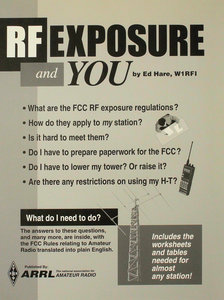
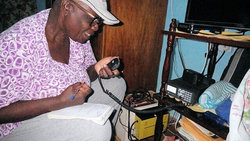
.jpg) The latest episode of the On the Air podcast (Episode 16) focuses on Parks on The Air (POTA), one of the most popular activities taking place in amateur radio today. We chat with Audrey Hance, KN4TMU, a relatively new ham who recently operated from Panther Creek State Park in Tennessee.
The latest episode of the On the Air podcast (Episode 16) focuses on Parks on The Air (POTA), one of the most popular activities taking place in amateur radio today. We chat with Audrey Hance, KN4TMU, a relatively new ham who recently operated from Panther Creek State Park in Tennessee..jpg) The latest edition of Eclectic Tech (episode 30) discusses the continued use of the PSK31 digital mode, and how many amateurs are using it to "rediscover" the joys of real keyboard-to-keyboard conversation. Also, QST and QEX author Phil Salas, AD5X, discusses the revolution taking place in small, inexpensive vector network analyzers, or VNAs.
The latest edition of Eclectic Tech (episode 30) discusses the continued use of the PSK31 digital mode, and how many amateurs are using it to "rediscover" the joys of real keyboard-to-keyboard conversation. Also, QST and QEX author Phil Salas, AD5X, discusses the revolution taking place in small, inexpensive vector network analyzers, or VNAs..jpg)
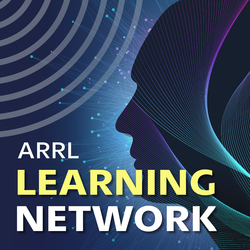 operators and shortwave listeners (SWLs) since the radio hobby began. Noise has gotten worse over the last 20 years or so with the advent of widespread solar power, LED lightning, grow lights, and digital devices. Learn all about finding and fixing RFI in today's world.
operators and shortwave listeners (SWLs) since the radio hobby began. Noise has gotten worse over the last 20 years or so with the advent of widespread solar power, LED lightning, grow lights, and digital devices. Learn all about finding and fixing RFI in today's world.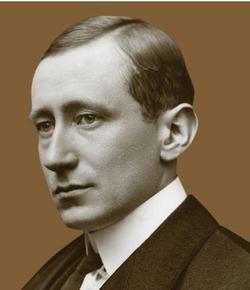 correspondence are 31 letters from Marconi to his Chief Engineer, Richard Vyvyan, written between 1902 and 1909, regarding the construction and successful implementation of a transatlantic telegraph system. The collection also includes Vyvyan's extensive manuscript overview of wireless technology, "Notes on Long Distance Wireless Telegraphy and the Design and Construction and Working of High Power Wireless Stations," written between 1900 and 1904.
correspondence are 31 letters from Marconi to his Chief Engineer, Richard Vyvyan, written between 1902 and 1909, regarding the construction and successful implementation of a transatlantic telegraph system. The collection also includes Vyvyan's extensive manuscript overview of wireless technology, "Notes on Long Distance Wireless Telegraphy and the Design and Construction and Working of High Power Wireless Stations," written between 1900 and 1904.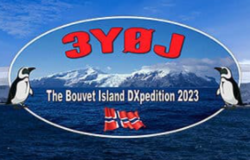
.jpg) desperately need the global DX community to support our mission and help us make this important activation of the second-most-wanted DXCC entity. It is only through this kind of support that we can achieve our mission of making 100,000 contacts or more from Bouvet."
desperately need the global DX community to support our mission and help us make this important activation of the second-most-wanted DXCC entity. It is only through this kind of support that we can achieve our mission of making 100,000 contacts or more from Bouvet.".jpg) Special event station GB1PPP marks the April 9 death of Prince Philip, the Duke of Edinburgh, at age 99. A World War II Naval officer, he was the patron of the Radio Society of Great Britain (RSGB).
Special event station GB1PPP marks the April 9 death of Prince Philip, the Duke of Edinburgh, at age 99. A World War II Naval officer, he was the patron of the Radio Society of Great Britain (RSGB)..jpg) Amateur Radio Day on Sunday, April 18, "Amateur Radio: Home, But not Alone."
Amateur Radio Day on Sunday, April 18, "Amateur Radio: Home, But not Alone."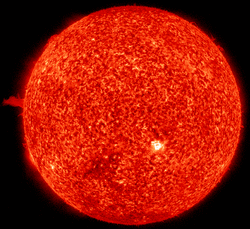 At 2338 UTC on April 14, the Australian Space Forecast Centre issued this Geomagnetic Disturbance Warning: "Geomagnetic activity is expected to increase to active levels with a chance of an isolated minor storm period from late April 16, due to coronal hole effects."
At 2338 UTC on April 14, the Australian Space Forecast Centre issued this Geomagnetic Disturbance Warning: "Geomagnetic activity is expected to increase to active levels with a chance of an isolated minor storm period from late April 16, due to coronal hole effects."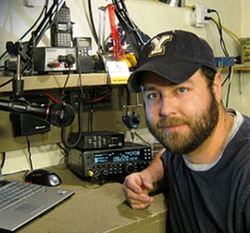 The SSB
The SSB .jpg) Researcher and innovator Ulrich Rohde, N1UL, has been awarded the Cross of Merit of the Federal Republic of Germany. He was nominated by Markus Söder, president of the German state of Bavaria and member of the Bavarian Parliament. Söder said that Rohde's work as a scientist, university lecturer, developer, and entrepreneur in the fields of radio frequency and microwave technology "has made a significant contribution to our country's technological advances, prosperity, and security." The Order of Merit of the Federal Republic of Germany, also known as the Federal Cross of Merit, is the highest tribute the Federal Republic of Germany can pay to individuals for services to the nation. Federal President Theodor Heuss established the Order in 1951 on the second anniversary of the founding of the Federal Republic.
Researcher and innovator Ulrich Rohde, N1UL, has been awarded the Cross of Merit of the Federal Republic of Germany. He was nominated by Markus Söder, president of the German state of Bavaria and member of the Bavarian Parliament. Söder said that Rohde's work as a scientist, university lecturer, developer, and entrepreneur in the fields of radio frequency and microwave technology "has made a significant contribution to our country's technological advances, prosperity, and security." The Order of Merit of the Federal Republic of Germany, also known as the Federal Cross of Merit, is the highest tribute the Federal Republic of Germany can pay to individuals for services to the nation. Federal President Theodor Heuss established the Order in 1951 on the second anniversary of the founding of the Federal Republic..JPG) Over the Horizon (OTH) radars in ham bands may be too numerous to count. The IARU Region 1 Monitoring System (
Over the Horizon (OTH) radars in ham bands may be too numerous to count. The IARU Region 1 Monitoring System (.jpg)








